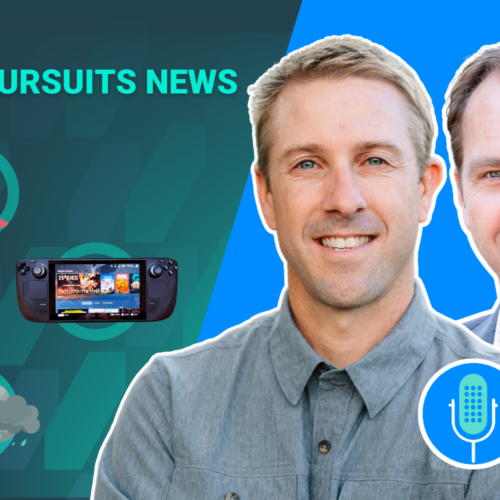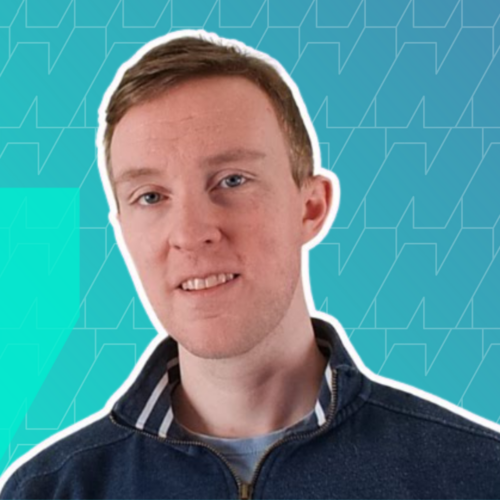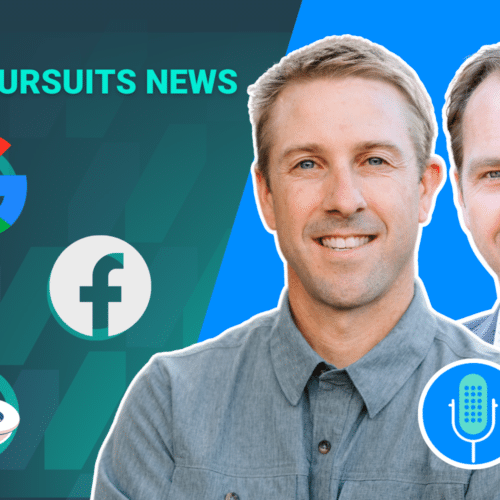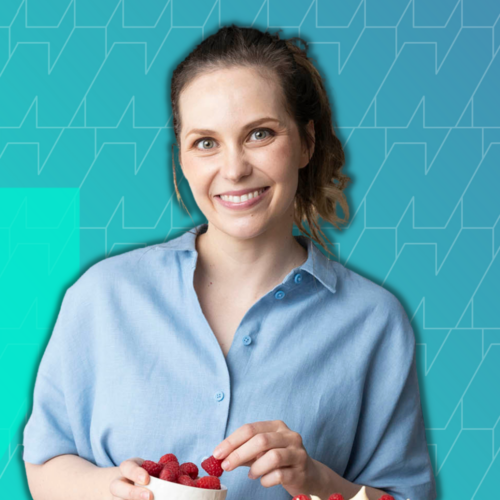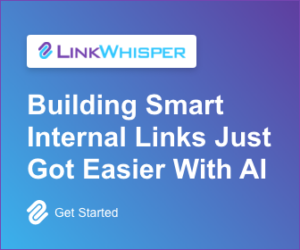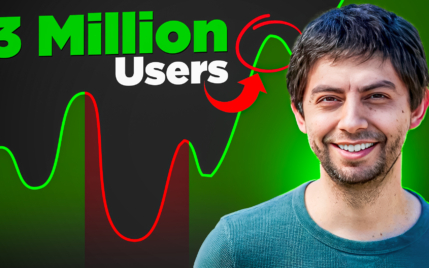How Hilary Erickson Makes $16K Per Month From Courses Helping Her Readers
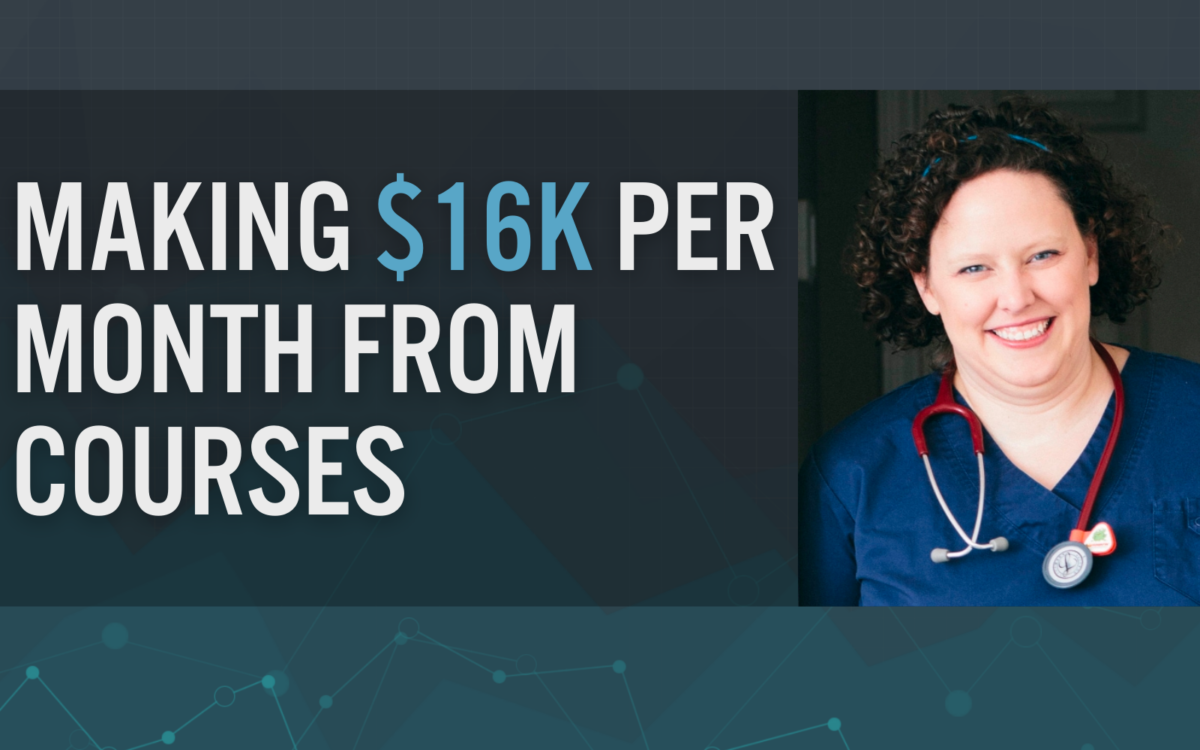
When you buy something through one of the links on our site, we may earn an affiliate commission.
Hilary Erickson is today’s guest on the Niche Pursuits podcast. Hilary has been blogging since 2005, starting with a mom blog that became a massive hit on Pinterest.
Her blog now covers several topics reaching around 200k monthly page views and earning her between $12-16 thousand dollars each month, with most of that income coming from selling prenatal courses.
Hilary highlights her journey from the start. She discusses what she did in the early days for content and where her focus is today for her two blogs.
And since online courses are responsible for most of her revenue — Hilary walks us through creating a course for your business, including advice on the tech needed, what to focus on, where to host the course, and much more.
Hilary chats about TikTok and Pinterest, particularly where she believes the social media platforms are heading today and the best way to use them.
In addition, Hilary also gives her views on topical authority, which is interesting because her ‘Pulling Curls’ blog covers multiple topics. So it’s fascinating to hear her thoughts on this.
Some of the things discussed by Hilary Ericksen include:
- Pinterest — how good it was, how good it is today, and should you still use it?
- Google Understanding what your website is about
- Which tools and software she has used to find keywords
- Bridging the gap between topics for Google
- How to see what Google is ranking you for
- Sponsored posts
- Updating and editing courses
- How she is using email to sell courses
- Future-proofing your business with email
If you have a website and you’re not monetizing with courses or driving people to an email list, you’ll get a lot out of this episode from an inspirational woman making a full-time income from her websites.
It’s another excellent episode; as always, take notes and enjoy the interview.
Links And Resources Mentioned During The Interview:
- Pulling Curls
- The Pregnancy Nurse
- How Hilary Erickson Makes $16k Per Month Helping Families
- Convert Kit
This Episode is Sponsored by: Rank IQ and Ahrefs.com
Watch the full interview with Hilary Erickson:
Read the full transcription:
Jared: All right, welcome back to the niche pursuits podcast. My name is Jared Baumann and for today's episode, we are joined by Hillary Erickson, Hillary. Welcome. Hey,
Hilary: so happy to be here. Thanks for having me, Jared.
Jared: Yeah. Good to have you. So this is your first podcast interview. However, you're not new to the niche pursuits audience.
You, um, contributed basically, I guess, for lack of a better terms, like a guest post or an article about your success. And it was so well received that we thought, Hey, let's make that into a podcast episode.
Hilary: Yeah, I love being here. You guys contacted me, wanted to know more about my story. I'm unique, cuz I've been doing it for so long.
I think so.
Jared: Yep. I was taken aback when I saw when your first site that you're working on, even to this day was started. I won't bury the lead though. Why don't you fill us in a little bit on your background, your history on your websites and where you're at.
Hilary: Yes. So I'm Hillary Erickson. I started my blog.
I mean, it was a mommy blog back in the day in 2005 on blogger, of course, where all the cool kids were. Yes. And I just really, I've always enjoyed writing. Um, but at the time I was a labor and delivery nurse and, but I did not talk about labor and delivery nursing on the website. It was more family. I shared like a lot of deals.
We lived in the bay area, so we were trying to live cheap and, you know, I just kept writing it, just enjoying writing. It probably shared too much about my kids. Like I see a lot of people doing now on social media and. I just kept doing it and I always wanted it to be more popular, but I just, you know, I tried Facebook, Facebook didn't really work.
Um, but in 2014, Pinterest came on the scene. Um, and I figured out how to ramp it up using Pinterest and creating articles that were more informative. And I'd always really liked graphic design, but I hadn't really figured out that I could marry the two. And that is ultimately, I think what ended up being the scaler of my website was really improving my images using more stock photography, because I wasn't gonna have 400 pictures of me being pregnant on the website.
So 2014, I really started ramping it up and yeah, and then now I live in Phoenix. I have three kids. My oldest just graduated from college, so, wow. He was little in 2005 though.
Jared: and obviously Pinterest has changed a bit, you know, maybe catches up on the last couple of years and just from a high level, any changes you've made in terms of your strategy with, with the.
Yeah.
Hilary: So obviously Pinterest is horrible now. but, um,
Jared: I didn't wanna just say it, but I'm glad you said it ,
Hilary: it's definitely not the traffic cow that it used to be. So you used to pin 20 to 30 images a day on Pinterest, and it would just bring you traffic. As soon as you put a pin on there, you could see a bump in traffic, which was amazing.
It is not that anymore. Ultimately, I only see much traffic from older pins and so, um, those just live out there. I maybe re-pin one popular pin once a week and I do about three new pins a week. Three to, I mean, maybe five because I do new posts and stuff like that, but I'm really not like focusing a lot of like new stuff on Pinterest, but old stuff does still continue to bring in traffic, which is awesome.
And I am finding, I just dropped to three to three a week and I was pinning daily from each website. I have two websites pulling curls, and then I have another one, the pregnancy nurse, and I, and I dropped from seven to three and I've seen an increase in traffic, but who knows if it's just seasonal or if it's really related, we'll just have to see.
But. I miss it. I miss old Pinterest
Jared: well, I wanna talk about some of the Pinterest things, um, a bit later on in, in, in, in the interview today, um, with Pinterest kind of dying off, like where is your website? Let's talk about cuz pulling curls.com is your main, your main website. And, um, it's the one that you discussed in the, um, in the, the, uh, the blog post.
I don't know why I'm blanking on it and we'll reference the blog post in the show notes as well for so if you're listening or you're follow along, we'll include that in the show notes, you can listen to the interview and then go back and cross reference the blog post as well. But pulling curls is what you referenced a lot in the blog post and maybe bring us up the speed on what type of website that is today.
It's not really a mom blog anymore. I'll I'll, I'll say that outta the gate and then maybe just share some basic income, some revenue just so we can get an idea for the scale of the site and, and traffic and, and where your revenue sources
Hilary: are. Yeah. So pulling curls is just there to help simplify family life for families.
Each article is written to help simplify something, be it Disneyland, or, you know, checks at the hospital, IVs at the hospital. Like we write about everything. I know there's sites that are like, oh, we write about everything, but we've gone like pin worms to Disney princesses. Like we really, we really hit.
Pretty much everything, nothing about men. Okay. We don't write much about men.
Jared: Fair enough. there's not much to write about us. Don't worry. .
Hilary: So now, though, in about 2015, I created my online prenatal class for couples. Um, and it's just slowly evolved until that's the big money maker for the website. And then I have two other courses that also supplement that income.
Um, but I had just noticed that there wasn't like an easy way for couples to get a prenatal class in. They had to come to our hospital at Tuesdays at 6:00 PM, which I love teaching. I taught prenatal classes for my hospital, but as a mom, it was like the worst time of the day to teach, like to be away from my family.
And it was the worst time for them. They were so tired. Half the time one partner couldn't be there, which was like the worst. So I just thought taking it online. Wouldn't make sense. So I have that online course. I have a home organization course, and I have like a organizing your family course. It's not really parenting because I don't know that I'm a great parent, but I am good at like.
Wrangling them into an organized system. So, um, that, that website pulling curls really just aims to funnel people into one of those courses and to help people obviously. Um, and then, you know, we have advertising on the website. I don't do so many sponsored posts anymore. I definitely did in the beginning.
Um, every now and then I find one that fits well. And so that's what pulling curls is now. And then I made the second website, the pregnancy nurse. So most of my more like scholarly writing would be on the pregnancy nurse about pregnancy. And, you know, I still do fun articles on pulling curls about pregnancy, but most of the like nitty gritty stuff, I kept to the pregnancy nurse just because I understand that once moms are done being pregnant, they don't wanna think about it anymore.
Jared: I have a one year old here and I can vouch that my wife would probably not want to think about it for a while too. yeah. Yeah. So what kind of revenue is the, um, what kind of revenue in page views is the, uh, the pulling curls website bringing in at
Hilary: this point? So polling curls gets about 200,000 page views a month.
Um, and I, I'm not great at separating out the revenue between the two, as far as like affiliate income pregnancy nurse is on media vine. It gets less page views than media vine requires. But because I was with media vine for so long with polling curls, and because I've worked with them in a few different ways, they, they nudged me in.
And so pulling curls between the both of 'em, where we we're making about 12 to $15,000 a month. But, um, you know, back in 2020, when all prenatal classes like died because everyone was taking them at the hospital, we definitely had ginormous months that were super exciting. But since then, there has been a rush of prenatal classes on the internet and, um, you know, the income has gone down, but it's still great.
Still grateful for it.
Jared: That's great. Yeah. Especially if and you were saying, I think you. The more the, the lion share or at least more than 50% of your income off the courses. Right. So that's, yeah, that's what you've really done. But 200,000 pages a month is no, um, that's no small feed, so I think you're doing really well.
yeah. Let me ask you that.
Hilary: But I have to say like my page views peaked in probably 2015 and either lingered around two, you know, 300,000 was kind of, uh, maybe it hit almost close to 400,000, but it's really been angling the page views to sell courses. So affiliate income, you know, really give people what they need rather than just like yay.
A page view.
Yeah.
Jared: Not all page views are created the same. Is that what you're saying? No, no, they are not. Yeah. Um, well I have a lot of, I've already written half a page of notes here. I have a lot of questions, but I, I wanna go back to the very beginning and maybe just talk through a big question I have is how you, how you transition this site from say 2005 blogger mom blog.
I mean, you know, that's obviously a kind of a ubiquitous phrase that people use and we kinda get an idea for that, but into this very, very focused site about helping parents and very, you know, directionally focused on course sales. How did you walk through that process? Was it, uh, something where you lingered on it for a while and then overnight made this decision?
Or did you, did you slowly evolve into it, having certain things that, that gave you the impetus to do that? You know,
Hilary: Yeah. So I read the famous Ruth Soka book and it was something like blogging without selling your soul, something along those lines that a lot of us read back in like 2014 and she just showed us how to use Pinterest.
And, um, you know, I quickly realized that if somebody was gonna pick on a pick, click on a pin on Pinterest, there had to be like something they were gaining from that article. So every article needed a reason that somebody is gonna click on it, you know? And I see a lot of people who are just like people wanna see pretty pictures or like what's happening with my family.
No one wants to see that on Pinterest. That's what the blog was in 2005, you know, it was a little bit of like, here's how to get great deals on fruit snacks. But, um, you know, I really needed to angle articles like how to stop throwing up. I took a lot of my nursing knowledge and wrote articles about it, cuz I used to work phone triage for a pediatrician.
So I thought all of those things that I had learned, I turned into articles so that they could really help people. And then those just did really well on Pinterest. So it was really just. Why, why does a reader wanna come to my site? They don't wanna see me or my kids. They want information and that's what I can give.
And I was actually really good at that. I just, um, hadn't really funneled it into how it could make a website.
Jared: How could make a website? Yeah. We had, uh, a guest on a couple months ago, Emily Dyson, and she talked about how her site was built entirely, really on, on, on Pinterest traffic and then nose dived.
And then she went through a process over the course of a year or so of building that traffic back up via optimizing for search. And her story was, was pretty dramatic in terms of the drop off. And then the scale she, she went back on. How did you start to identify that Pinterest wasn't working anymore and then transition away from Pinterest as your, as your primary traffic?
Hilary: I mean, I still wanna pump Pinterest for absolutely everything. Pinterest will give me, so I definitely still write posts that are Pinterest, like mistakes you might make in the labor room. Like those type of articles tend to do well on Pinterest. And so I still write those every once in a while. Plus I think they're fun to write.
I think they're more personable. And if people find those articles after finding an article on induction, they tend to find that I'm more human and that I have more information to give, but I started using rank IQ, um, to build my SEO on the website. Although I have to say pulling curls is hard. It, because it writes about everything.
Google is like, who are you? What are you about? You're very confusing to me. And so it has been a slower go on, um, SEO, but updating older posts using rank IQ has really helped. So posts that they already think that I am an expert on when I update it and add all those words for rank IQ I've seen for Manka Q have seen good benefits from that overall.
Jared: So that's interesting to hear you say that. I wanna ask you about kind of this topic of like topical authority and writing about a bunch of different subjects, but I'll save that for a little bit later, cuz I wanna stay on this. Um, uh, but I'm really curious to hear your opinions on that. The, the, the topic of, of Pinterest and, and kind of, you know, what you're doing now with Pinterest is there for people listening who missed the 2014 boat on Pinterest, like.
The ship sailed on 2014. Pinterest, the ship is, is out to see and gone, but is there value in someone who has a website right now and has content that actually could serve a Pinterest community? Well, like, is there value in them actually even bothering to try right now? Or is it more just because you're already in it, you already have a good process and you already have this aged to count with Pinterest that it, that it might still be working.
Hilary: It, it is a rough. Because I have a second side. So I made a pregnancy entirely, um, Pinterest and I am even pinning it from this larger Pinterest account. Um, you know, so I do have juice that I can give it, but, um, it is failing to thrive if it was a baby I don't know, you know, if I was like learning how to make pins and learning how to pin and I didn't already have a Pinterest scheduler, then I think it would be really overwhelming and maybe may make me want to not do it.
Um, that being said, when I go to a website and I read a really good article and they don't have a pinnable image, I'm like, that is a loss. Of something I could have shared because a lot of times I'll be like, oh, I wanna pin that. A lot of times people feature me in an article and I'll be like, dang, I'll pin that for you because pitchers is probably the best juice that I can give somebody.
Um, and then if they don't have a pinnable image, I'm like, well, shoot, I don't know what to do for you. So I do think everyone should be making like a 600 by 900 image for every post so that people, and they should have a social share button that people can pin it. Because I think pins directly from an article really Pinterest is like, Ooh, that's like organic.
That's very exciting. It gets excited by that. I think versus like just, you know, scrolling on the Pinterest page and re-pinning other people's stuff. So I think everybody should have a Pinterest account and be doing it. Should you be making 10 new pins a day? No, I don't think you're gonna get a whole lot of return on that type of investment unless you're a foodie.
the foodie still do really well. Mm-hmm but that's a whole other bag of chips. Yeah. Yeah.
Jared: Well bag of chip. Well played you you've got some D , so, okay. Okay. Yeah. I, I, I ask people who talk about Pinterest. I ask 'em like, is it worth it right now? And the general sentiment does seem to be that, you know, we're recording in 2022 and it's a rough go.
It's a rough go. So, um, I think
Hilary: Pinterest just needs to realize that it is the female. I know I'm gendering this out search engine. Women love to look, see the picture, scroll that way. If they could just be like, yep, that's what we are. We are the visual search engine. We're gonna throw some ads in there. Um, and keep being this visual search engine.
They could totally make a go of it, but they're like, let's be TikTok and Instagram and a visual search engine. And that's just.
Jared: I was gonna ask you, is there Pinterest certainly like came on the back for marketers of Facebook, right? Like Facebook had all this great organic reach. You didn't have to pay for that reach.
They introduced boosting and all of a sudden over time, like the algorithms started to favor, um, uh, more paid traffic. And so you'd have to pay to play on Facebook. A lot of people pivoted to Pinterest. Pinterest was a great place to get lots of organic traffic that replaced Facebook. Now, Pinterest has kind of gone the way of the Facebooks and the Instagrams of the world.
I, is there anything you're looking into for what's next for what might be driving future traffic to your site from a social media standpoint?
Hilary: I mean, I'm on TikTok pregnancy related entirely pregnancy. Um, and it does drive more traffic than Instagram, I think like when you go viral on TikTok, those people click on your link.
Um, and so that's exciting, but it's just not the same as Pinterest where, you know, they, you know, that they were looking to stop throwing up. They click through you, you know, that they're coming for you, whereas TikTok, not exactly sure how people found me, you know, if they just hate me because I'm not a doula and that's why they're clicking through, you know, it's just a really varied, um, hard to say why they're clicking through, but I'll take them.
I'll take him. Fair
Jared: enough. Okay. Well, let's talk about that. You tease this concept of topical authority. Your site is, um, you know, is, I'll say. Pulling curls cover so many different topics from what you say from Disneyland to, I don't remember the re pin worms. Yeah, pin worms. It's a great reference again, you you've got some good, uh, you've got some little good acronyms or clips or whatever you wanna call them, but so your site covers so many different things.
Have you ever seen that to be an issue as it relates to topical authority? Like talk, talk about how you go about coming up with topics that maybe align with what Google is looking for. I'm using air quotes for these. Listen, those you listen on the, on the podcast. Uh, audio.
Hilary: Yeah. So I think you do have to like bridge it in Google's mind.
So I had some pregnancy stuff that was ranking, and then I decided to write about pregnancy at Disneyland, right? So I've built the bridge to Disneyland. So I ranked for pregnancy at Disneyland then maybe can I rank for what to eat at Disneyland or what backpack to take at Disneyland? You know, can you build that bridge?
Um, something that you're already doing to the other land? I think it's sometimes possible, but it is harder. I will say, now that I have this fully niche site, it does seem easier to be like that girl is pregnancy a hundred percent. We love that. She knows what she's doing. And I do put in every single article, Hillary Erickson is an RMBS N and has 20 years of labor and delivery experience so that, you know, It shows that I have that now I put that on most pregnancy articles on polling curls, the new ones.
I definitely put it on. It's not on all the old ones, you know, but I can't say that about Disneyland, although I have been going to Disneyland for longer than 20 years, but yeah. You know, it's hard to be like, I am a Disney, I'm sure somebody out there has some sort of Disney certification program, but I do not have that nor do I want that.
So I just think it's harder to show that I'm an expert on all these different things, even though I obviously am. So dang you Google . Um, yeah, clearly I don't know. I think, I think it's important to have like an author box that, or, you know, an about me page or mention your expertise as much as you can in these articles and to also write on the same top.
Topics, you know, really frequently. Um, but other than that, that's really all you could do. I, I mean, I would never tell someone to write a pulling curls website at this point in time. Yeah. It's too general. It's too vague. Um, ultimately pulling curls is the brand that branches out into different areas. Um, I just call it like a media empire at this point, that being said, I love that my, I can write about pinworms one day and I can write about Disneyland the next day.
And I can write about like how to communicate with your doctor the next day, because I love to write about lots of different things. And I think it's prevented me from having any burnout because I'll just be like, I, I can't do, um, you know, I can't do beta strep today, but I can do you know where to watch the parade at Disneyland?
Jared: So how far have you gone? Let's let's use a Disneyland analogy, maybe if that makes sense. Like, I love your example of. Um, being pregnant, like that's kind of the, maybe the basis of pulling curls or at least the foundation of where a lot of topics start because you know, you're a labor and delivery nurse and you have that background and then pregnancy at Disneyland is the bridge.
It's the Disneyland. Like how many topics have you written about and maybe are actually ranking for, as it relates to kind of some of the more tertiary or secondary Disneyland
Hilary: topics? I mean, I ranked for a good number. The other thing is I used to rank for family budget. Well, I still rank for family budget.
Um, like certain keywords. I can't even remember, but because I ranked for that, I could write about Disneyland budget. Right. So you try and take what you wanna write about like Disneyland budget, Disneyland blogging is like my hobby and I just enjoy writing those articles. I think they're fun. Um, and I would love for them to rank on Google.
So I take what I. Google thinks I rank about. And you can tell that in the Google search console, Google thinks you're an authority on these things that are ranking, right. And they're getting traffic and they're ranked well. And then how could I pivot that into an article that I would think would be really fun to write about mm-hmm then you try and find, you know, the low volume keyword you use rank IQ, put all those together.
Hopefully you can get an article that ranks and sometimes, you know, it, it is a gamble. Sometimes they rank and sometimes I'm like, that is an amazing article. I am clearly an expert and I am not, Google does not think that that I am. So
Jared: who does not think that you are? Well, uh, you know, it's, it's worth mentioning.
I, I don't know this, but I run a marketing, like an SEO marketing agency for my day job. And I will say. We've seen, it's a lot easier to work with sites as it relates to topical authority that are older, you know, and your site has been around for going on 20 years now, you know, so as it relates to Google trusting topics that get put out there, like to some degree, you've been semi routinely blogging and writing for almost 20 years, since 2005 on this website, I wonder, you know, who knows how much of an impact that might also have compared to somebody who might want to try that same approach on a website?
They started six months ago.
Hilary: Yeah. I definitely have a higher domain authority on pulling curls than I do on the pregnancy nurse. But I think still for pregnancy, Google is like that girl knows pregnancy, this pulling girl's girl. She's crazy.
Jared: But you're the same person
Hilary: Google doesn't seem to care.
Jared: Yeah.
Well, Google has their ways, do they not? let's um, before we get into kind of your courses and, and how you've built that out, uh, cuz I really want to ask you about, about that sort of thing. Um, you, you mentioned that you, you used to do some sponsored posts and you don't as much of it now. Um, talk about, uh, how sponsored posts worked for you previously.
Uh, maybe a little bit about, you know, how you got those sponsored posts and then why you don't do it as much now. Um, I'd love to hear some more on that.
Hilary: I mean I, 100% did posts for free product back in the, I mean I started advertising on blog, her probably in 2007, I would guess. Um, and they would send sponsored posts every once in a while or maybe we'd get like $35 and the free product to post.
And we were like, yeah, totally. You know, because I was a hundred percent a nurse at this point in time. And so I would write those different kinds of things and then it just, you know, Expanded like, no, I wouldn't write a post for 35. The, the money went to 500, right. Because I'm good at writing articles. I got a lot of traffic.
Um, and at that point in time, I knew that an article on Pinterest would, you know, get a certain number of views. It would get a decent amount of use. Um, but ultimately now I, I probably have priced myself out of the market because write a post, you know, you gotta think that this is a writer who has 20 years of writing website, post experience, um, who has a certain amount of a theory, um, you know, and clout behind her in order for me to write that post, it is gonna be, and especially if it is for a drug maker, because I am an RN, I get a lot of like, come write about this pregnancy test or whatever, you know, that's gonna be like $5,000 because I know you're gonna come back with stupid, um, edits that you want me to write about certain, certain things.
You know, and I'm very clear that I am the last word in the post when I do a sponsored post. And so ultimately I just think I'm probably more expensive and I don't know that people would even get the return out of me writing the article. But in order for me to get the, the amount of time, it takes me to write an article and to give away just a little bit of my clout to those people.
That's what it costs.
Jared: So, yep. I love how you, you conveniently just dropped in. You went from $35 to $500. I was expecting to say like $75 or a hundred dollars.
Hilary: I don't even remember. It was so long ago, but I remember when I finally was like 500, I will not go below 500 and now I'm just like, I mean, there probably are people that would pay the $5,000 for me to have a due, but I'm just like, no, you are not my people.
So it doesn't because I need to save all of that. I love Hillary so much for courses. I don't need to give it to, um, here's your pre-term labor test.
Jared: Yeah, that's interesting. You talk about how you're thinking about the viewer or the people that access your site and then what the, what the site's kind of primary focus is now.
Yeah. Which is courses. Yeah. Well, let's talk about courses. So when did you, uh, take us back to when you first decided to launch a course, uh, how you picked the topic, how you vetted it and then how you put it together?
Hilary: So, I mean, it was a prenatal class. I had already taught prenatal classes for my hospital.
I had already written like some mini prenatal class content for my blog. And I just thought this makes a lot of sense to write a book about it. I think I may have written a book before that book, but I'm not even sure. So, um, but ultimately it started out as the book because there really, I mean, this was way back in the day.
There was not like there was no teachable, maybe there was teachable, but it was like astronomically priced for me because it was really important that I, you know, make as much money as possible. Um, and so I started with a book and then as soon as the book was done, I was kind of looking with how I was going to transition it to a course on my website.
And so I initially used a plugin called lifter LMS, had it on my website, did not use a SubD domain because I was my tech support at the time, which was a big mistake. And then anything I changed on the course would mess up stuff. I changed on the blog blog stuff would mess up the course. And so it ultimately was just a tech nightmare.
So then I moved to teachable in probably late 2015, maybe 2016. Um, and I did see a jump in sales. I think people just felt like it was a little more legit. Um, you know, looked more polished and maybe because I was investing that thousand dollars into teachable, I took it a little bit more seriously and made it a little bit more polished.
Um, And then I've been on teachable since then. Although my plan is this fall when my teachable contract is to move is up like how much I paid. Um, I'm gonna move to learn with thrive cart just because it's a one time payment and I will be able to host it and have a little bit more control over the things.
Um, and I do love a one time payment okay.
Jared: I you've clearly proven the model out. So, you know, even a higher one time payment for you would probably pay itself off in dividends quickly. Yeah. Um, so, well, what's the, what's the, the makeup let's say of your, kind of your flagship, your prenatal course. Like how long is it?
How do you break it up? Um, uh, how much is it priced? Just, you know, just trying to get my mind around exactly what it looks.
Hilary: So it is, I always say it can be done in three hours, but that would literally be like sitting down, watching every single video, not looking at anything else, but I think a lot of people don't want a prenatal class that takes 12 hours.
Like nobody's like, yes, that sounds fun. I just wanna sit there and absorb. I mean, I think a lot of pregnant people think of it that way that they wanna sit down and, and absorb, but I don't think partners do so because my class is aimed for couples. I wanted to make it that they could sit down and cruise through it.
And in fact, if partners even want even less than the three hours, they can do just the key point videos, which is like the cliff notes version of each chapter. You're talking. I just enjoyed that. Yeah. So, um, it is, it has three hours of video content. It's probably just a little bit more than that at this point, cuz I added one more, um, video on my most recent update and then it has, uh, all the texts.
So if you're a reader, you can get it that way. Um, it has the key points. It has a quiz that goes through the key points, cuz I always love those kind of things just to make sure that you're like actually getting it. Um, and because it's for couples each, um, section has questions for the couples. So let's say.
It's about hospital admission. Like the chapter is about that. And I'm gonna say, you guys need to discuss who you're planning on coming to the hospital. Now this mattered more before COVID, although it's coming back into play, but a lot of times the partner thinks, yeah, my mom's coming to the hospital. If your mom's coming to the hospital and the partner person is like, your mom is not coming to the hospital, she's not even welcome.
I don't even wanna see her while I'm there. And just getting those things out of the way. So,
Jared: um, all of us, listen, have kids are all of us listening to have kids are just chuckling right now to ourselves. Cause we.
Hilary: Or where is the baby gonna sleep? Because a lot of times the pregnant person is like, it's gonna sleep in the bed with me.
Right. Which I don't, I'm not a cos sleeper, but a lot of times that's what they're thinking. And the partner is like, there's no way the baby is gonna be in our bed. Like they're envisioning a two year old stuck between them and what that would entail. Right. And so just discussing these things ahead of time, I thought was really important.
And I, I kind of was like, this is kind of stupid when I put it in, but it has actually been one of the things that in my reviews, people are like, I loved the couple's questions. Um, and they're probably stupid for me because my kid oldest is graduating from college. Right. Like to me, this is, this is baby stuff because it is baby stuff.
Um, and then I have some bonus videos on like natural pain management talking with your doctor, like how to do no bone stuff, like how to change a diaper, how to take a temperature, all those different kinds of things. Um, and so that's what the class is. I try and give it. In as many different ways that people consume as possible.
Um, and you can actually buy it at three different price points. So I still have the book because the book is like $35. I want everyone to be able to get this information. So if you are a reader, you can buy the book. Okay. Then there is a $99 one that you can get just the videos and all that kind of information.
And then if you want, uh, more interaction, more, more of me, you can get the deluxe version that has the Facebook group. It has printable labor movement cards. It has the printable book or the downloadable book. I'm hoping no one is printing out the book. Cause that would take a lot of paper. It has live Q and a with me, it has replays of the old Q and a with me.
So if you just want everything, you can get that. And that one is 200, but you know, ultimately this goal is to try and educate as many pregnant people as possible and pregnant families. And so it's really important for me to keep the price point low, but then offer, you know, a higher end version if people want more of me, because that's what takes the time is me.
Cause once the course is made, it's made, it just runs in there. Um, you know, I updated and all that kind of stuff, but it's not the same as like me being in a live Q and a, or answering your question on Facebook.
Jared: I'm curious because you kind of settled on a, a little bit of a, of a focus with the course, right.
It sounds like it's prenatal, but for couples, uh, how important has that focus been or is it more just accidental the way that your course turned out that way? Because they talk about in marketing, right? Like kind of niche down a little bit, have a specialty, have a focus, have something that makes your product unique, heard you talk about not only who it's for, but just the feedback and the reviews.
Like, it sounds like this couple focus has been somewhat important for you.
Hilary: Yes and completely. I think like. I just fell into it. Like I was like, how is my gonna be different? But honestly, when my course was made, I was the only one doing a hospital course. Everyone else's was, uh, laboring at home, like natural birthing at home, which I am like the antithesis of like, I don't know anything about it.
I don't know how to help you. You make me nervous because of all my experience. And so, um, but I just thought, you know, how could I be different? And I just felt like, I feel like families is so important. And I think educating the dad can be so important so that they feel less nervous and more tied into the pregnancy so that hopefully when the baby comes out, they feel more tied into that baby.
And they can just start off easier just because I've found that to be so important in my own life. But ultimately. I don't know that I put that much thought into it when I actually started
Jared: it just wish. I'd not about your course when we were having our first, all the stories you have are, are so similar.
Like my wife and I were trying to find time to go in the evenings to like, what is it every six week? Or, you know, it's like six weeks, you know, one night a week. And we just couldn't. So we had to. Take the whole Saturday course. Oh, that's a, and it was, it was Valentine's day, actually. Not that, you know, that's a big deal, but, um, but it was Valentine's day and I, by like hour six, I'm just like glossed over.
I can't even comprehend what we're talking about anymore. Cuz there's just so much information coming right at you. So, you know, would've been great to have a course to kind of do it your own pace in the evenings when you have a free night. So I think it's great. Um, yeah. I think people
Hilary: love the bites yeah, because you can just like, okay, now I understand C-sections and it doesn't have to take over my life tonight.
Right? Like we're moving
Jared: on now. We're moving on. Um, talk about the production value and like how you produce the course. Is it really high production value? Did you kind of get a video team or, or on the flip side, did you get an iPhone out and just kind of roll with it? Like, and again, I'm just trying to think of people who have an expertise.
Maybe even have a platform haven't done a course and they're thinking, oh, but it sounds like so much work. I know nothing about the production side of things. Yes,
Hilary: it can be really daunting. So I think that the most important part for a course is the audio, right? Because, um, people are listening to you. So making sure that you have you are micd well, I think is so important.
Um, the video is handy. Um, and in my video, I actually, um, invested in a program. I think I use we video for that course where I can add a lot of stock images. So they even had hospital ones, you know, um, where I could show them drawing blood. I could show them putting in an IV. I could show the, or, you know, I could add images so that if I wasn't looking so great on camera, which happens, you know, or we needed to cut it, that I could just throw stock images over it and cover it up.
So I am the video team. Yep. Well, my husband is too, so we just set it up on a tripod. We have a ring light and we just recorded it. Now we recorded it in my, kind of like off, off of a bookshelf so that we were just trying to like have as neutral of background as possible. Um, and now I have like a YouTube.
Set. I mean the set, but it's just nice to have a place set up. If you have a family that doesn't like have laundry in the background, because , it's easy to have laundry in the background. So I, uh, I filmed it all myself. I, I actually have my son who just graduated from high school, but if we're thinking six years near high, he would do, he will do a rough edit of the prenatal class.
So he takes out the ums, he takes up the back it up, Spencer. He takes out, um, those kind of things and then sends it to me. And then I do the final edit, I add titles and that kind of stuff. But, um, he has always been hired as my video editor and he actually has his own YouTube channel now and is monetized.
Whereas I am not monetized. So that's an area of concern, but full family affair. It's been us. Yeah. And I think in order to keep it reasonably priced, um, which I think going forward, people are maybe gonna value their dollar a little bit more and they probably don't need, I mean, I've looked around at studios cuz I was thinking about filming my, um, newborn section again and I called around and it was just like astronomical prices just to rent a studio.
So I actually had a friend who had an empty room in her house and so we filmed it there with just like a table and stuff like that. So I think there are places that you can find, um, to make it reasonable. And the one thing I always tell people with courses is you can always update them. Like mm-hmm this course was like not as good as it is now in the beginning.
Um, and if I find that people aren't loving a certain section, although I haven't really found that, or I, you know, I'll go through it, I'll be like, oh, why didn't I add this part? And so I can just go in and add it real easily. A lot of times in we video, I'll just do a voiceover and add a little section.
Um, you cannot always update them. That's the beauty of courses because you just like upload a new video file and boom, it's there. what
Jared: are you using specifically for capturing, for editing, for recording? Just, you know, what kind of, what, what software are you using?
Hilary: Yeah, so I did invest in a good video camera.
I have a can a D D um, and then I have an external mic. I have. A road, um, clip on microphone that I use to when I'm filming those sorts of things. I found that that's important because I used to have a wired one, but one time I almost like I pulled it out of the camera and it didn't capture any audio. So the, the mic, I think it's Bluetooth.
I don't even know what it is, but it connects to the camera somehow by the magic of audio. I dunno. Um, also my husband does help with a lot of that. He is a former band director. He now teaches like junior or community college, but because he's so into audio, he does help the audio, which I think is so important.
And we actually have a podcast. So audio is pretty important. He edits the podcast and those different kind of things. So it's Def it is a family affair and my daughter does the, um, transcriptions of the podcast and oh, perfect. Capturing,
Jared: yeah, everyone
Hilary: involved. Well, you know, once you make a certain amount of money, you're looking for the write offs and kids is definitely a great way to do it.
Um, and we would like. Pay them half and the other half goes into their 5 29. So, but during COVID, those kids were rich because they didn't have anywhere to spend it.
Jared: They, and plenty of time to work.
Hilary: Yes. They were all working for me. We were updating stuff and I was like, you have more in your accounts than I do.
Jared: So you, uh, at some point launched a couple of additional courses. You talked about a home organization. Course. You talked about a family organization course. Um, how did those evolve are, are, and I'm curious, are they, are, are they kind of a, I don't wanna call an upsell process, but at some point when you get people in the, the flagship course, the prenatal course, do you come back to them and offer them the, the home organization or their family organization?
Course. I'm just curious how these, how these all develop.
Hilary: So, I mean, I just love organizing it and people have like, like friends have just like brought me in to help them organize different things. And I love like thinking, like how could I make a system easier for my family to make it work? And so I just thought a home organization class would be fun to make.
And I basically have three pillars of my website. I know we've talked a lot about Disney, but ultimately the website is organization, family and pregnancy. And so I was like, I feel like we're leaving money on the table or we're not helping as many people as possible. So that's why I created the family routines.
Mm-hmm I have had some people who have bought the prenatal class and then come back and buy the organized home. But you know, nobody like right after they have a baby is like, Ooh, let's get organized. They're just like, my life is falling apart. So after they have their baby, I do transition them into my parenting series.
Um, you know, and you know, All along that way. I do offer the course and I think people who take the prenatal class end up really liking me. And so they wanna stick with me, but I don't know it's they are completely separate beasts. Like I never am like, well, I'll sell, 'em a prenatal class. And then I'll sell, 'em a whole organization class.
And then I'll organize those toddlers. Like, no, that's not what they're, I, I didn't do it. Right. But they're fun. And they're the ones that I enjoy. And because I enjoy them, I think they sell. Right. But the prenatal class does sell the most, um, followed by the organization and then the family, I think it's, I think it's hard to sell to moms the more, you know, people are like, oh, I'm gonna make a mom course.
I'm like good luck. Moms have a lot. They have a lot to figure out how to get into their budget and constantly they're like, well, do I need this course? Or does Johnny need new shoes? Shoes are always gonna win out. So,
Jared: yeah. Hmm. That's a very interesting point. That's an interesting point. Well, um, you know, we, we glossed over, but I, I, I'm going backwards now, but I'm actually walking through my mind how you're selling these courses to your audience and that sort of thing.
Where is, uh, the primary sources of traffic to your website? You talked about how it's around 200,000 pages a month, and obviously we've gone through Pinterest and where it's at, where, what drives most of the traffic right now?
Hilary: Um, Pinterest and Google are driving most of the traffic. Um, I think Pinterest is still a little bit higher than Google.
Um, on the second site, the pregnancy nurse, it is mostly Google. Pinterest is, um, I don't know if it's even third TikTok, mine even be before Pinterest, sadly. So, and so that's where they're coming in from.
Jared: Yeah. So when it comes to how you are selling the course to the audience and the people that come to your website, are you selling it straight from the articles themselves or are you moving people onto an email list and then selling it through like an autoresponder sequence?
How are the bulk of people buying the courses that you have.
Hilary: Yeah. So I will, I will let them buy in any way that they want to. I definitely direct pitch the course in every post, but I also have, you know, email opt-ins every course has a, like a mini course that people can take before they take the big course.
Um, I have a free beginning prenatal class. I have a five word organization challenge, and I have a, a practical parenting series that has like five of my best mediocre pregnancy or parenting tips. So, you know, they can do any of those, but I do offer other ways to get on the email list. Cause I'm not sure that everyone is up for like courses immediately.
And so, um, you know, I have a free hospital packing list. I have quizzes that do pretty well also, surprisingly. Um, and so, you know, I just, every single post, I either want to sell them something. Get them to buy a course or to just make them love me more realize that I respect me as an, an authority in this area.
Right. But I do have people who directly buy from TikTok or Instagram or the podcast. Like I have, I am hitting every, every person wherever they could be. So, um, and hopefully, ultimately it leads to course sales like that as. That is what everything is designed to do and to help people. It just sounds like I'm just like a greedy, uh, the monopoly guy over here, just like trying to make all the money, but I am definitely, that's part of why I'm on TikTok, cuz I think there's a lot of young moms who probably can't even afford the $35 prenatal class who are out there that I'm giving good information that will help them have a better birth in addition to, um, you know, having some fun on TikTok, I guess mm-hmm
Jared: well, it's it's this is a, uh, this is like a marketing and, and, and business podcast.
So it's okay. You can talk about the, the business goals of the website. Um, but we haven't touched on the email list. Like, you know, how's uh, how, how, how are you working with email? How are you, uh, you know, how's your email list built out if you don't mind sharing like some rough numbers and maybe how many, you know, do you have autoresponder sequences or do you just kind of pop in and send out a blast style email once in a while?
What are you doing with email? Cause it sounds like it is a, a factor. You've got a lot of freebies and, and offers that drive people to email. So how are you using email to sell courses? Yes.
Hilary: I am deeply in bed with my email program. In fact, I started like pretty soon after convert kit came out, like, and everyone was talking about segmenting and all that kind of thing.
Um, and I have, I think it's like a hundred different auto responders.
Jared: Oh my okay. You're yeah, you're definitely in on email. yeah,
Hilary: maybe it's not, maybe it's like 80, but it is a good number of auto responders. Now. Some of them are just like one and done, like, um, you know, like if you wanna know about Bosch mixers, like I might just send you like five emails about like how I use my Bosch mixer.
Like some of my best affiliate programs. A lot of times I will have, um, a short autoresponder on. Um, but yes, when you have a website that's about everything. I knew that if I wanted to do an email thing, it had to be heavily segmented mm-hmm mm-hmm because I couldn't, you know, send me the 45 year old mom, 46 darn um, a pregnancy information.
Like that would be an immediate turn off to me. Right. Because I don't care about that at all. And if that's what this person is gonna send me, I'm not interested. So I knew that if I'm interested in organization, I should only pretty much be getting organization stuff. Right. And if I'm interested in pregnancy, I'm pretty much just getting pregnancy content.
Now I do send out like a monthly newsletter where, you know, there's plenty of pregnant women who are interested in organizing as well because nesting, um, and so they can. In that like, share like my most popular post lately. And I have a little button that they can click that says if you're interested in more organization stuff, click here and I can help you with that as well.
So they can, like, they can traverse amongst the Hillary newsletter system, but in general, they remain in very segmented pots, um, where they only get information about, you know, those few things. Yeah. Um, and there is a lot, it is, it is a lot. I actually left convert kit because I had. There the forms on my site from them just started dying.
And I, and I had been with them for so long. I texted or I, you know, talked to them, their customer service. And they were just like, yeah, well, we changed our forms. So you're just gonna have to go in and like change 'em on your site. And I was like, you have got to be kidding me. I've been with you for so long it's.
So it's really pricey. I'm not even sure that convert kit is worth it because I, I don't know how many people actually are converting on a newsletter. Um, I wish it was higher. Like I'm constantly tweaking how I'm emailing people, what I'm emailing people, but I will say more people by cold off the site then buy through my newsletter.
Hmm. Okay. So I am actually with bird send, which is, uh, maybe a quarter of the price of convert kit and does all the same things. It just doesn't have like the convert kit name around it. Um, So, yeah, but everything has an autoresponder. Um, and I do usually send out like about a new podcast. I'll send it to those people that are opted in for that.
Sometimes if I write a new post that I think will be really helpful, I'll send that out. I don't send out like every single new post, but some of the new ones I'll send out, but usually everyone's getting an email from their bucket at least once a week. And then I should say that when they join, they're usually getting about five emails daily, just to be like, Hey, I'm Hillary, you love me.
Right. Just. So remember why they signed up and who I am and kind of what I have to offer.
Jared: Is that something that you, you spent a bulk of time setting up, you know, outta the gate when you were, when you, when you decided to go, uh, all in, on an email or have you kind of built these up over time?
Hilary: Um, when I decided to build a pregnancy newsletter, I was like a full week of like, I don't.
12 hour days just creating, because I initially did like nine separate pregnancy newsletters, so they could sign up for whatever month they were in. And then it was, it was a lot I have since then simplified cuz I found that that wasn't as helpful as I wanted it to be. Um, and so now they sign up for what trimester they're in, but um, every week I'm in there trying, just adjusting, seeing what I can do to fix adding new content that I have to that newsletter chain, stuff like that.
Jared: Do, um, I'm gonna put you on the spot here. Uh, yes or no. Do you think people who don't have, uh, any sort of email list and any sort of email autoresponder sequence, do you think they should for their website? You do. Okay. Absolutely. Yes. What's the best immediate. Yes. Okay. I was sensing maybe you were like a little overwhelmed by, I don't know how many I convert there, but it sounds like there's so many other benefits you get from it along with some conversions that it's, it's more than worth it for.
Yes,
Hilary: those are the people that absolutely love me. I'm not saying that every single person on my newsletter are those people, but the ones who would follow me anywhere would do anything, would promote anything are on that newsletter list. And should I lose my Instagram, my TikTok. Like, I would be pretty hard to lose my website, but if I lost all of those things, I could still.
if I, I don't know if the internet goes down, we're just all screwed, but, um, I can still email those people and be like, this is where I am. And they'll be like, I'm so glad I found I'm back with you, Hillary. You are my people, you know? And so it's the one thing you own, right? I mean, I own my website. I own my podcast.
I think it's so important to think about who actually owns this. Right? Because I do own my podcast. Right. I own my website. Those aren't things people can take away from me. Um, and newsletter is definitely one of those things. Mm-hmm um, and so many people have all of their chips on Instagram or TikTok or Facebook.
And I've seen so many creators because I've been doing this for so long. Get that taken away. Goodbye. And there's no way to like contact those people either. If you don't have an email list, you can't even say go to the real Hillary Erickson and that's where you can find me, you know?
Jared: Right. Yeah. So it's almost even with all the benefits that you can experience today, you're talking about future proving some of these platforms that have well proven to be very unstable for people.
unfortunately. Yeah. That's a great point. That's a great point. Where, where, where would you recommend someone who doesn't have an email list or autoresponder sequence set up? Like where would you recommend? They begin, you kind of touched on like, maybe you wouldn't spend 12 hour days for a full week setting everything up outta the gate.
Um, you know, what's like a good, small micro goal that people can have that would still help them get started. So
Hilary: I always recommend that people start their first thousand. They're just sending out like a monthly newsletter. Cause at that point it may not be worth your time to create an autoresponder. It could be like, if that's really what you wanna do, but at that point in the game, usually you're trying to just get up content.
Um, you know, and then once you have those first 50 to a hundred posts on your site, then you could start thinking about creating that autoresponder that could send 'em to those best posts that you have. Um, which can be really easy to write. But I always say get up. Newsletter thing because people who really like you will even look for it.
Like now mine is just like, fuck, get my hospital packing list, come to my pregnancy series, like get a birth plan. Like I'm peppering it in through a post. But even if you just have one that is like, love what you see here, like, come, come join me on my newsletter. Even though that's completely lame and most people will not sign up for it.
At least it's something. Um, and then you can up your game as you get further and further into it, but definitely have the email list start building it. I think, um, MailChimp still gives you your first thousand for free, which can make it feel less daunting. And usually MailChimp just like integrates with everything.
And it's not that hard to transport your newsletter list to a different company. If you decide you wanna leave, um, Mailers or whoever you wanna go with.
Jared: That's great. That's great. Yeah. Maybe even skip the auto responder sequence at first and just start sending out your best content. And then once you get a little bit of traction, start building out, maybe a, a five email sequence or something like that.
Yep. Yeah, well, as we kind of bring it to a close here, I mean, this has been really fun. I, I we've, we've touched on so many topics. I mean, I'm looking back over, obviously there's such a great opportunity for everybody listening and, and we touch on this every, you know, couple episodes or whatever we have guests on at talk about how much more you can do with your traffic than just throw up ads, put up affiliate offers.
Um, and so it's been really great. I think the bulk of it for me, that I took away was really how great you've done with course sales and how great you've done with really applying your expertise to courses. I mean, obviously you have an advantage that you are a labor and delivery nurse. I didn't ask. Or are you still doing that or did you transition out of doing that at, at some point in time along that journey?
Hilary: No, once I hit just about 20 years, I was like, and that's enough and COVID okay. I was mid COVID and hospitals are not a really fun place to be at.
Jared: I can imagine. Yeah. We have some nurses in the family who, who, who kind of echo the same thing, so, okay. So you're full time at this. So really we've gotten to listen to like a 20 year journey.
That's, that's really brought you full circle into where you're full time at this. So that's great. Um, but just also your thoughts on topical authority. Uh, we talked about Pinterest, we talked about, um, about, uh, about how you're, uh, structured an email list, uh, sponsored posts, uh, and probably a bunch of other things that I'm not even mentioning, but, um, yeah.
Any things that we, anything we didn't cover that you think is really important, uh, to mention for, for people listening, as we close out.
Hilary: um, two things. So first off, like when I went into TikTok, I know I've talked about it before, but I felt like I needed to be like the dancing pregnancy nurse, which I am not like, I'm fun, but I'm just not that kind of fun.
And I made it my own. I talked to the camera, just like I do in my courses. People know exactly what they're getting from a course, cuz that's who I am on TikTok and just doing it consistently, showing up every day, you know, being that person on TikTok and then reusing it on every single platform. So I film on TikTok, but I put it on reels.
I put it up to YouTube. Sometimes I make a pin, uh, pincher pin idea. Idea pin. That's what it is. Mm-hmm . Um, and so you can reuse that content that took you like 30 seconds to create in so many different places. And I wished I had been doing that from the very beginning, cuz it really has helped my YouTube channel, at least since subscribers.
Um, but either way, I'm still getting my message out there. And every once in a while, some, you know, one will do really, really well. So, um, be you and have fun with the different platforms cuz social media, people could tell if you're not having fun, um, you know, and be you. So those are the things that I would say on that.
And the other thing is a lot of people are like, well, how did you do it? How, how have you built this thing? And I'm like, well, first off I started in 2005 and 1000 we're 17 years later and it's just showing up, you know, writing the articles, hoping that you're writing it, right. Writing the articles that you would wanna find if you were looking for it and then.
Being like, I hope it works. And then showing up the next day. And even if whatever I did yesterday or two months ago, didn't work. I'm trying it again. Um, just constantly, you know, it is a job. I wake up at 5:00 AM. I go to work, I get kids out the door. I throw in laundry. I go back to work, you know, I work out, I go back to work and then kids come home and I answer emails because that's something I can do really easily alone, but it is a job for me.
I think a lot of people are like, oh, you're just like going to Disneyland every week. And I do go to Disneyland, but I, it, it is a job. And if you're not gonna treat it like a job, it probably is not gonna give you the long term income that you're
Jared: looking for. It's inspiring. Hear you talk about it because, I mean, I think we can say for certain that when you started in 2005, your website.
It had, I don't wanna say no direction, but it didn't have the direction that we now look back on and think, oh man, I need to be thinking about the courses. I'm gonna create this, you know, the topics I'm gonna write about all that. And it's just a wonderful story for someone who showed up every day and learned as they went and just kept pivoting into the things that were working and away from the things that weren't working.
Hilary: Yeah. And pivoting toward what I found was fun because a lot of times I'm just like this isn't fun anymore. And I'll either hire it out. If it's absolutely necessary, like responding comments on my website, I have hired it out because I don't need to be offended by every comment that I read. Um, or I've, um, just stopped, you know, whatever it is.
Like I don't, I don't film a lot of stuff for Instagram anymore because I don't find it fun. So. It is what it is.
Jared: yep. Yep. But you're focusing other things, so, you know. Yeah. Yeah. Well, Hillary, thank you so much. Um, again, the website is pulling curls.com. If you wanna go reference it, I'll also include, um, a link to the, uh, the blog post you wrote for niche pursuits.com, which probably has some details we didn't cover.
I did read it before the interview, but, um, I've been so immersed in our conversation that we'll include that and you can go read it and there's probably some other great details in there. Um, yeah,
Hilary: it, it talks more about like my, um, like my income and like how it grew. And if you go to pulling curls, it's not my thing anymore, but I did income reports from the very first like Google check ad sensee check up until I hit about $10,000 a month.
So if you're looking to be like, what, what exactly did you do as you grew this thing they are on there. It's under like miscellaneous, because it's not. It's not like one of my three pillars, but it is there. And I think a lot of people find it really helpful to know that it just takes a lot of hard work and consistency and it's a job
Jared: well, perfect.
That's more reason for people to go over to the website and check it out. People love a good income report, especially in the early days when they can see the track record now of success. But, you know, it's so encouraging to dive into something at the beginning and see where it started. You know, people are not alone in that.
all right, Hillary, thank you so much for coming on today to the niche pursuits podcast, all the best. And we'll talk again soon. Thanks so
Hilary: much, Jared. Have a good day. Yeah.
Jared: Again, a big thanks to Ahrefs for sponsoring today's podcast. HFS is an all in one SEO tool set. They help you get more traffic from Google by helping you understand what you need to fix on your website.
Now you could hire this out to a, a costly consultant, or you could go and hire an expensive audit agency, or you could use the power of ah, F's webmaster tools. It's a free resource. That's gonna help you prioritize those optimization opportunities on your site. In the long run, that's going to lead to more traffic from Google, which is a good thing.
it? Uh, the tool helps you see which keywords your pages are ranking for. Helps you understand how Google is seeing your content and helps you discover how making changes can blow up your traffic. Imagine what this could do for you in the long run. So again, thanks to HFS for helping us with the podcast today.
And you can learn more about this free tool by visiting ahrefs.com/webmaster-tools. Again, that's ahrefs.com/webmaster-tools. Have you been frustrated with your Google traffic lately? Are you tired of tools that make you search through millions of keywords and require a math degree to figure out there's an SEO tool called rank IQ that can help.
they're ranked number one on G2 for both ease of use and customer satisfaction. Rank IQ gives you a list of the lowest competition, high traffic keywords in your niche, and they're all clear winners. When you choose one of their handpick keywords, their AI takes over and gives you a simple report telling you what Google wants you to cover in your blog post.
Whether you have a new site or have been around for a while, rank IQ will take your Google traffic to a whole new level. Go to rank iq.com/niche pursuits to lock yourself in at 50% off their monthly. I'll put this special link in the episodes of description.
Want to learn step-by-step how I built my Niche Site Empire up to a full-time income?
Yes! I Love to Learn
Learn How I Built My Niche Site Empire to a Full-time Income
- How to Pick the Right Keywords at the START, and avoid the losers
- How to Scale and Outsource 90% of the Work, Allowing Your Empire to GROW Without You
- How to Build a Site That Gets REAL TRAFFIC FROM GOOGLE (every. single. day.)
- Subscribe to the Niche Pursuits Newsletter delivered with value 3X per week
My top recommendations

